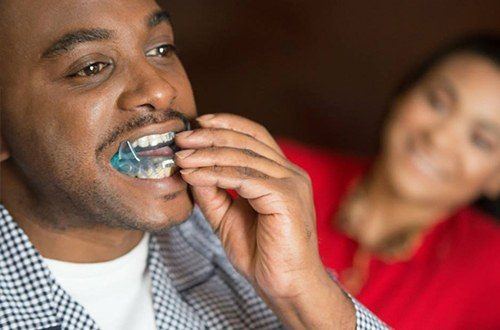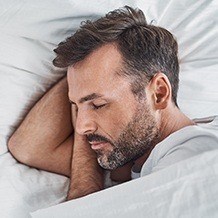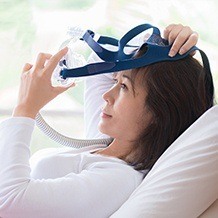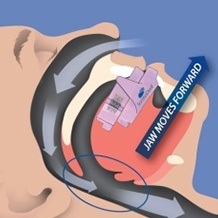
Oral Appliance Therapy – Baytown, TX
Oral Appliance Therapy Helps Patients Rest Easier

When it comes to treating sleep apnea, many patients still incorrectly believe that a traditional CPAP machine is their only option for relief. At Sleep Better Baytown, Dr. Dean Hutto is happy to let you know that this just isn’t true in most cases. A custom-made oral appliance from a well-qualified dentist can be a highly effective method for correcting Obstructive Sleep Apnea (OSA). In particular, this is excellent news for long-time sleep apnea sufferers who are intolerant to CPAP treatment because of its uncomfortable air pressure, facial masks, and loud sounds. If you are interested in finding out more about oral appliance therapy in Baytown, TX and determine whether or not your specific symptoms are a good fit for it, we invite you to schedule a consultation.

Is Oral Appliance Therapy a Good Fit for Me?
- Dr. Hutto is likely to recommend oral appliance therapy if a patient fits into any of the following categories:
- You have mild to moderate sleep apnea symptoms and have never undergone treatment before
- You have proven intolerant to CPAP treatment
- You have undergone surgery and experienced little to no relief from chronic sleep apnea symptoms
- You suffer from loud, chronic snoring without the presence of sleep apnea
- You use a CPAP but also travel regularly and are in need of a more portable therapy method
- You suffer from advanced sleep apnea and are in need of combined therapy (the use of a CPAP and custom oral appliance together)

An Invaluable Alternative to CPAP Intolerance
If you’ve ever undergone CPR training, then you should know that the first major step for opening a person’s airway is to reposition their jaw forward. Oral appliance therapy applies this same basic principle to sleep apnea treatment. Each personalized device will guide the jaw’s resting position into a more forward spot, preventing apnea episodes and helping patients breathe easier throughout the night. The appliances are designed to be as comfortable as possible, easy to remove, easy to clean, and easy to store in compact ways when traveling. As a result, patients are much more likely to use them diligently and successfully treat their symptoms!

What Should I Expect When Using Oral Appliance Therapy?
When compared with the use of a CPAP, sleep apnea patients have regularly reported a much quicker and more comfortable adjustment period when committing to oral appliance therapy. However, our Baytown team would still like to make you aware of a few side effects that may occur in the first few weeks of wearing the device.
- Sore teeth and/or gum tissue
- A change in your saliva production – either dry mouth or an increase in overall saliva
- Increased tension or general discomfort in the jaw
- A shift in the way your bite fits together that may feel strange

What Does the AADSM & AASM Recommend?
There are two major professional organizations that have set the standards for sleep apnea treatment regarding diagnosis, prevention, and overall treatment. They are known as the American Academy of Dental Sleep Medicine (AADSM) and the American Academy of Sleep Medicine (AASM). As a current member of the AADSM, Dr. Dean Hutto and the Sleep Better Baytown team are happy to help raise the bar for sleep apnea patients throughout the greater Baytown area.
Our practice follows the detailed recommendations laid out by the AASM and AADSM for patients undergoing oral appliance therapy to treat sleep apnea:
- It is recommended for patients who suffer from chronic, excessively loud nighttime snoring to undergo oral appliance therapy, even if they have not been diagnosed with sleep apnea. Treating snoring early on can help reduce their chances of developing sleep apnea in the future and provide more restful sleep.
- Customized oral appliances from a well-qualified dentist are virtually always preferable to non-custom oral appliances. Patients are much more likely to comply with their recommended therapy plan and experience a dramatic improvement in overall effectiveness when using a custom-made oral appliance.
- If a patient is intolerant to regular CPAP use and/or a frequent traveler, sleep physicians are strongly encouraged to recommend them to a nearby dentist who offers oral appliance therapy and partner with the practice to ensure a successful treatment approach for that patient.
- Patients who have been fitted for a custom-made oral appliance should schedule follow-up care with their dentist. This will allow the dentist to ensure that the device continues to fit comfortably and provide any additional guidance or treatment recommendations as needed.
- After receiving a custom-made oral appliance, patients should also schedule a follow-up appointment with their sleep physician for additional sleep testing. This will help them determine the overall effectiveness of the oral appliance.